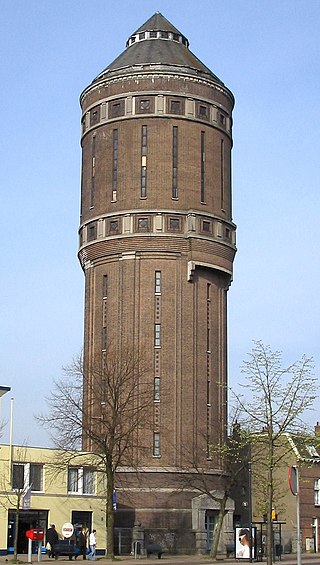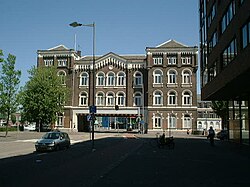
The Kunstmuseum Den Haag is an art museum in The Hague in the Netherlands, founded in 1866 as the Museum voor Moderne Kunst. Later, until 1998, it was known as Haags Gemeentemuseum, and until the end of September 2019 as Gemeentemuseum Den Haag. It has a collection of around 165,000 works, over many different forms of art. In particular, the Kunstmuseum is renowned for its large Mondrian collection, the largest in the world. Mondrian's last work, Victory Boogie-Woogie, is on display at the museum.
Jacobus Ruurd "Jaap" Bruijn, was one of the best known and respected Dutch maritime historians. He was professor of maritime history at the University of Leiden from 1979 until his retirement in 2003. During his 41-year teaching career as The Netherlands' only university professor of maritime history, he guided the doctoral theses of no fewer than 49 graduate students.

Voetbalvereniging Staphorst is a football club from Staphorst, Netherlands. VV Staphorst plays in the 2022-23 Vierde Divisie.
Jack B. van den Berg is a Dutch football manager and a former player. While coaching ASWH, he won the 2005 national amateur championship and the 2006 Rinus Michels Award for managers in nonprofessional leagues. During a long stint at BVV Barendrecht Van den Berg became a full-time coach. In 2015–2016 he coached the first squads of two small town rivals, promoting both ASWH to the Saturday Derde Divisie and IFC to the Sunday Hoofdklasse. From February until October 2018 he coached VV Katwijk, winning a Tweede Divisie championship.

VV Goes is a football club from Goes, Netherlands. In the 1911–1912 season Goes played in the second tier of Dutch football. Over the years Goes played mostly in the Tweede and Derde Klasse. In the national 1934–35 KNVB Cup Goes started and lost third round against VV Terneuzen (2–0). It was booted first round in 1957–58 by NOAD (2–4) and in 2011–12 by Zwaluwen Vlaardingen (1–5). Since the 1990s Goes played at times in the Eerste Klasse. In 2017 the club promoted and began its third season in the Hoofdklasse, where it has previous played from 2012 to 2014.
2018–19 Eerste Klasse was a Dutch Eerste Klasse association football season of the Eerste Klasse.
Roda '46 is a Dutch football club from Leusden. It was founded on 15 September 1946. The club has Saturday and Sunday football teams. Its Saturday football team plays in 2018–2019 in the Eerste Klasse, while its Sunday team plays in the Derde Klasse. Roda's home grounds are at the Buiningpark in Leusden.

Anet Bleich is a Dutch journalist, political commentator, author, columnist and writer.

We Are Here is a collective of migrants based in Amsterdam, the Netherlands, which campaigns for human rights for its members and all undocumented migrants. The asylum seekers have in many cases had their applications to remain in the Netherlands denied but they either cannot go back or refuse to return to their country of origin. They demand access to social services such as medical care and housing. The group formed in 2012 and by 2015 contained over 200 migrants from around 15 countries.

Vrankrijk is a legalised squat and self-managed social centre on the Spuistraat in central Amsterdam. There is an events space on the ground floor and above it a separate housing group.
The WNC squat was a self-managed social centre in Groningen, the Netherlands. It was squatted in 1985 and evicted in 1990.

Squatting in the Netherlands is the occupation of unused or derelict buildings or land without the permission of the owner. The modern squatters movement began in the 1960s in the Netherlands. By the 1980s, it had become a powerful anarchist social movement which regularly came into conflict with the state, particularly in Amsterdam with the Vondelstraat and coronation riots.
Ecotribe Teuge is a collective of people living on a squatted terrain in the Dutch countryside. It is located on the edge of the village of Teuge, in the province of Gelderland. The buildings were constructed by the Nazis and formerly used to house Moluccan soldiers. The site was occupied in 2001, when people began to live there in an off-the-grid and self-sufficient manner. Since 2018, there are plans by the province to develop the terrain.

The Tabakspanden are a group of buildings standing on the Spuistraat in central Amsterdam, adjacent to the Keizerrijk and Wijdesteeg alleyways. Named after a former owner, the speculator Hendrik Tabak, they were mostly squatted from 1983 onwards, although the artist Peter Klashorst also rented an apartment and gallery space. The best known building was Spuistraat 199, known as the Slangenpand (Snakehouse) because of the large mural which covered the front exterior. In 2015, the squatters were evicted and the buildings were mostly demolished prior to redevelopment. The new project is known as De Keizer and has 69 apartments, a restaurant and a gallery. Two of the buildings are registered as rijksmonumenten.

De Vloek was a squatted, self-managed social centre in The Hague, the Netherlands, between 2002 and 2015. Located on Hellingweg 127 in Scheveningen, beside the North Sea, the squat hosted workplaces, living spaces, a venue, and a vegan restaurant. The local council tolerated the occupation until 2014, when it decided to sell the building. A political struggle over the eviction began; some political parties supported the squatters and the Scheveningen Pier was briefly occupied as a protest action. A deal was made for the squatters to move to a former school building and the Vloek was eventually evicted in September 2015.

The Ubica buildings are two adjacent buildings standing at 24 and 26 Ganzenmarkt, in central Utrecht, the Netherlands. Number 24 is a rijksmonument. The first recorded mention of the buildings is from 1319. After centuries of residential use, the buildings were bought by the Ubica mattress company in 1913 and used until a devastating fire in 1989. The buildings were then squatted for 21 years, before being redeveloped into a hotel and café-restaurant in 2014.

The Amsterdamsestraatweg Water Tower is located in Utrecht, the Netherlands. The water tower was built at Amsterdamsestraatweg 380 in 1916, in the style of the Amsterdam School. It became derelict in 1986 and was repeatedly squatted before its redevelopment into apartments began in 2020.
Huize Ivicke is a monumental building in Wassenaar, the Netherlands. Constructed in 1913 for A. F. J. van Hattum, it is a replica of the Eremitageslottet hunting lodge in the Jaegersborg Dyrehave in Denmark. It was inhabited until the mid-1980s, when it became offices. Since 2000, it has been owned by speculator Ronnie van de Putte, known as the "Slum King of the Netherlands". He refuses to renovate the building, despite its monumental status. Heritage groups warned the local municipality in the late 2010s that the villa was severely dilapidated and it was placed on a list of the fourteen most threatened monuments in Europe. It is currently the subject of an intense dispute over emergency renovations and was squatted in 2018, by people wanting to carry out essential repairs. The house, the formal garden, the gate and the playhouse are all national monuments.

NIDA is a political party in the Netherlands, describing itself as "being inspired by Islam". It was founded in 2013 by Nourdin El Ouali, a former municipal councillor in Rotterdam for GroenLinks. The party is currently only represented at the municipal level, with two seats in Rotterdam and one seat in The Hague. The party shares the same electorate as Denk, mostly Islamic immigrants, although NIDA is more religiously oriented.
Dean Diego Guezen is a Dutch professional footballer who plays as a midfielder for I liga club Zagłębie Sosnowiec.














